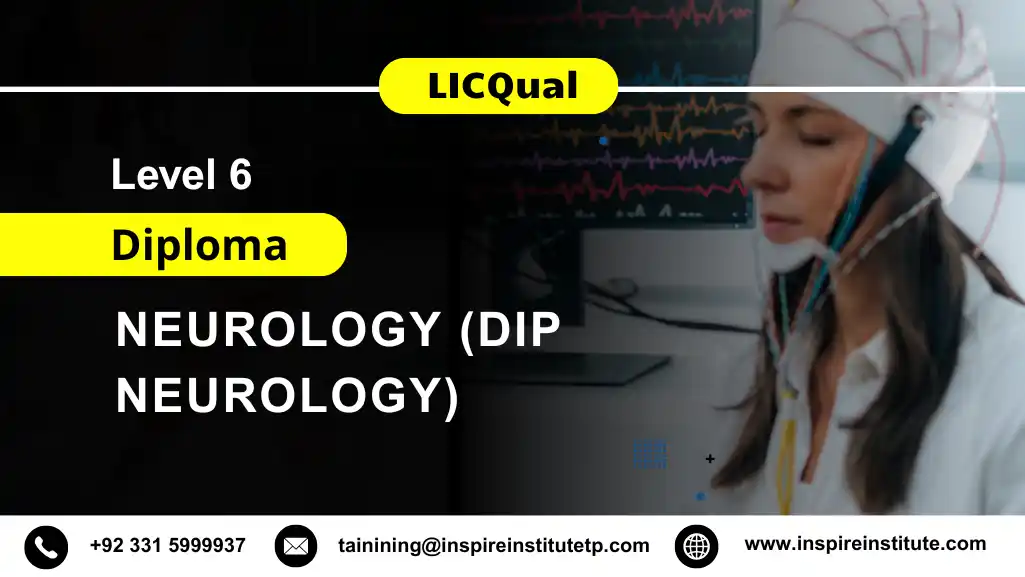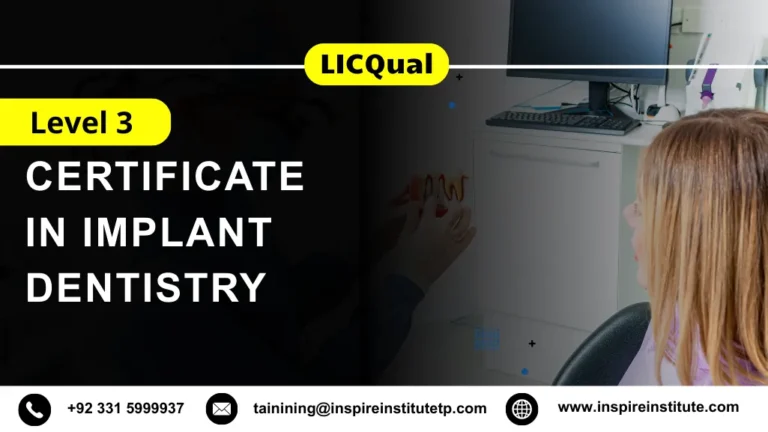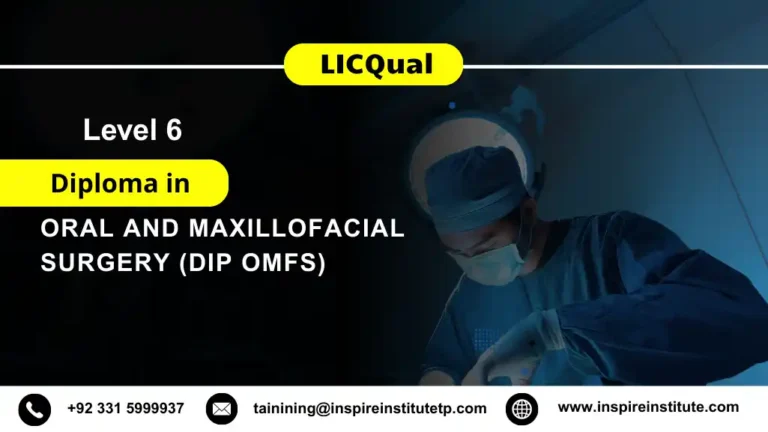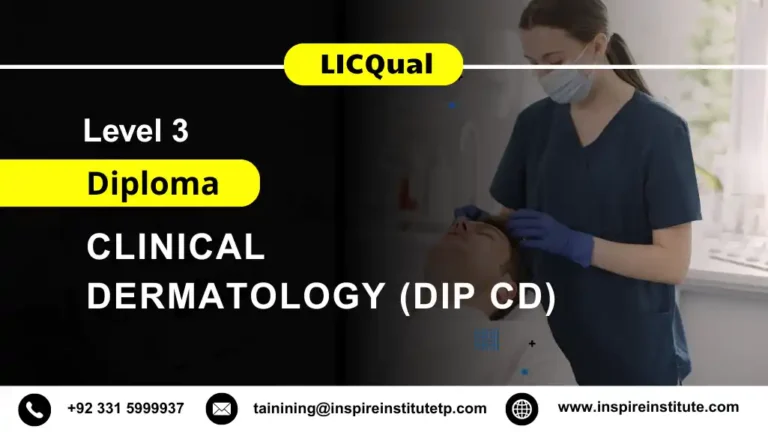LICQual Level 6 Diploma in Neurology (Dip Neurology)
The LICQual Level 6 Diploma in Neurology (Dip Neurology) is a UK-accredited qualification designed for healthcare professionals, clinicians, and aspiring neurology specialists who wish to deepen their understanding of neurological disorders and patient care. This advanced diploma addresses the growing demand for skilled practitioners capable of diagnosing, managing, and treating complex neurological conditions, from epilepsy and stroke to neurodegenerative diseases. By integrating theoretical knowledge with practical applications, this course equips learners to deliver evidence-based and patient-centred neurological care.
The course provides a comprehensive foundation in neurology, covering neuroanatomy, neurophysiology, and neuropathology. Learners explore critical areas such as cerebrovascular disorders, neuroinfections, neuro-oncology, and movement disorders. The curriculum also addresses advanced diagnostic techniques, including neuroimaging, electrophysiology, and laboratory investigations, enabling professionals to accurately assess neurological conditions and develop effective treatment strategies.
The LICQual Level 6 Diploma in Neurology also focuses on the integration of multidisciplinary care. Learners explore collaboration with physiotherapists, occupational therapists, psychologists, and other healthcare professionals to ensure holistic patient management. This approach fosters leadership and teamwork skills, essential for effective neurological care delivery in hospital and community settings.
Why Choose this Qualification
The LICQual Level 6 Diploma in Neurology (Dip Neurology) is a UK-accredited qualification designed for healthcare professionals, clinicians, and aspiring neurology specialists seeking advanced expertise in neurological disorders. This diploma equips learners with both theoretical knowledge and practical skills, enabling them to excel in patient care, clinical decision-making, and multidisciplinary neurological practice. With a focus on evidence-based approaches, learners are prepared to address complex neurological conditions, implement effective treatment strategies, and contribute to advancements in neurology.
Key Reasons to Choose this Qualification
Specialist Knowledge
- Gain a comprehensive understanding of neuroanatomy, neurophysiology, and neuropathology.
- Explore major neurological disorders, including epilepsy, stroke, neurodegenerative diseases, and movement disorders.
- Learn advanced diagnostic techniques such as neuroimaging, EEG, and laboratory-based investigations.
- Understand the principles of neuropharmacology and clinical interventions for various neurological conditions.
- Develop the academic foundation necessary for specialised neurological practice and research.
Practical Application
- Apply theoretical knowledge through case studies, clinical simulations, and research projects.
- Develop skills in patient assessment, diagnosis, and treatment planning for neurological conditions.
- Strengthen clinical decision-making in acute and chronic neurological care.
- Learn to interpret neuroimaging, electrophysiological, and laboratory data effectively.
- Enhance hands-on experience for improved patient management and outcomes.
Recognised Qualification
- Earn a prestigious UK-accredited diploma recognised internationally.
- Validate professional competence in neurology and clinical decision-making.
- Increase employability across hospitals, neurology clinics, and research institutions.
- Open opportunities for advanced postgraduate studies and specialisations.
- Strengthen professional credibility in local and global healthcare environments.
Flexible Learning Pathway
- Study at your own pace through an assignment-based structure.
- Access online resources, mentorship, and digital learning materials for continuous support.
- Balance professional responsibilities with academic advancement effectively.
- Progress smoothly through modules while enhancing both theoretical and practical competence.
- Adapt learning to suit individual schedules and career goals.
Evidence-Based Training
- Engage with the latest clinical guidelines, research studies, and evidence-based practices in neurology.
- Develop critical skills to evaluate and apply medical research in patient care.
- Learn to integrate scientific evidence into treatment planning and clinical interventions.
- Enhance ability to measure and monitor neurological outcomes effectively.
- Implement validated strategies for improved patient safety and care quality.
Career Development
- Expand career prospects in hospitals, neurology centres, and research institutions.
- Prepare for roles such as Neurology Specialist, Clinical Consultant, or Research Coordinator.
- Build eligibility for advanced training, residencies, or academic positions.
- Strengthen your professional profile for leadership roles in neurological practice.
- Open pathways for research, teaching, or healthcare policy development in neurology.
Enhanced Patient Care Impact
- Learn to design and implement patient-centred, ethical, and culturally sensitive care plans.
- Gain skills to manage chronic, acute, and complex neurological conditions effectively.
- Develop strategies to improve neurological patient outcomes and quality of life.
- Collaborate with multidisciplinary teams to ensure holistic patient care.
- Advocate for patient safety, ethical care, and evidence-based interventions.
Professional Growth
- Strengthen leadership, analytical, and clinical decision-making skills.
- Enhance research, critical thinking, and problem-solving abilities in neurology.
- Build confidence to manage complex neurological cases independently.
- Develop teamwork and communication skills for effective multidisciplinary collaboration.
- Emerge as a skilled, compassionate, and reflective neurology professional.
The LICQual Level 6 Diploma in Neurology (Dip Neurology) provides a comprehensive learning pathway that combines theory, practical skills, and professional development. By completing this qualification, learners enhance their expertise, improve patient outcomes, and position themselves as leaders in the field of neurology worldwide.
Course Overview
LICQual UK Awarding Body
Average Completion Time:
6-24 Months
Study Units: 6 Units
Evidence & Assignment Based
Mandatory Units
Who Should Take This Course
The LICQual Level 6 Diploma in Neurology (Dip Neurology) is designed for healthcare professionals and clinicians who seek to advance their expertise in neurological disorders and patient management. This programme provides an in-depth understanding of neuroanatomy, neuropathology, clinical neurology, and evidence-based treatment approaches. It is ideal for professionals aiming to enhance their practical skills, clinical decision-making, and leadership in neurological care. The course prepares learners to apply theoretical knowledge in real-world clinical settings, ensuring improved patient outcomes and professional growth.
This course is suitable for
Medical Practitioners
- Doctors and clinicians seeking specialised training in neurology.
- Professionals aiming to improve diagnosis and management of neurological conditions.
- Practitioners wanting to expand their knowledge of neuropharmacology and interventions.
- Physicians preparing for leadership roles in neurological departments.
- Individuals aiming to integrate evidence-based neurology practices into patient care.
Neurology Residents
- Residents pursuing advanced clinical skills in neurology.
- Learners focusing on acute and chronic neurological case management.
- Residents aiming to enhance proficiency in diagnostic techniques such as EEG and neuroimaging.
- Individuals seeking mentorship and guidance for neurological patient care.
- Professionals preparing for postgraduate examinations or fellowship programmes.
Nurses and Clinical Support Staff
- Nurses working in neurology wards or clinics seeking specialised training.
- Healthcare staff aiming to improve patient monitoring and neurological assessment skills.
- Professionals learning evidence-based practices for chronic and acute neurological conditions.
- Staff seeking enhanced communication skills for patient-centred care.
- Individuals aiming to support multidisciplinary teams effectively.
Allied Health Professionals
- Physiotherapists, occupational therapists, and speech therapists working with neurological patients.
- Professionals aiming to understand neurological disorders for better rehabilitation planning.
- Individuals seeking to integrate clinical knowledge into therapy and patient care.
- Practitioners wanting to enhance collaborative care strategies.
- Healthcare workers aiming to improve patient outcomes through applied neurology knowledge.
Researchers and Academics
- Professionals aiming to specialise in neurological research or clinical studies.
- Academics seeking knowledge to develop educational or training programmes in neurology.
- Individuals interested in publishing evidence-based research in neurology journals.
- Researchers preparing to contribute to innovative neurology interventions.
- Professionals aiming to evaluate and implement research-driven patient care.
Hospital and Clinic Administrators
- Healthcare managers aiming to improve neurology service delivery.
- Administrators responsible for neurological departments and patient safety.
- Professionals seeking knowledge for evidence-based policy development in neurology care.
- Individuals aiming to integrate clinical best practices into operational planning.
- Administrators aspiring to lead neurology-focused quality improvement initiatives.
Students and Lifelong Learners
- Recent graduates in medicine or healthcare seeking advanced neurology knowledge.
- Lifelong learners aiming to specialise in neurological disorders and patient care.
- Individuals preparing for clinical residencies or advanced postgraduate studies.
- Students wanting practical, evidence-based learning applicable to real-world settings.
- Learners aspiring to build a strong foundation in neurology for career advancement.
International Healthcare Professionals
- Doctors, nurses, and allied health workers with international qualifications seeking UK-accredited certification.
- Professionals aiming to standardise their clinical knowledge to international neurology practices.
- Individuals seeking recognition for expertise in global healthcare settings.
- Healthcare workers preparing for international career opportunities in neurology.
- Professionals aiming to enhance cross-border collaboration in neurological care.
The LICQual Level 6 Diploma in Neurology (Dip Neurology) caters to a wide range of healthcare professionals, from clinicians and nurses to researchers and administrators. By enrolling, learners gain advanced knowledge, practical skills, and professional recognition, empowering them to deliver exceptional neurological care and advance their careers globally.on both national and global levels.
Course Benefits
The LICQual Level 6 Diploma in Neurology (Dip Neurology) is a UK-accredited qualification specifically designed for healthcare professionals, neurologists, and aspiring clinical leaders who seek to advance their expertise in neurological sciences, disorders, and patient care. This comprehensive, assignment-based diploma integrates theoretical knowledge with practical applications, enabling learners to assess, diagnose, and manage a wide range of neurological conditions. Through evidence-based learning and flexible study pathways, this qualification prepares professionals to address complex neurological challenges and deliver effective patient-centred care with confidence and precision.
Key Benefits of the Course
Specialist Knowledge:
- Gain an in-depth understanding of neuroanatomy, neuropathology, and neurophysiology.
- Explore topics such as neurodegenerative disorders, epilepsy, stroke, and neuro-infections.
- Develop expertise in neurological diagnostics, neuropharmacology, and neurorehabilitation.
- Learn advanced treatment strategies for acute and chronic neurological conditions.
- Build a solid foundation for evidence-based neurological practice and research.
Practical Application:
- Enhance clinical skills through case studies, simulations, and research-based projects.
- Strengthen abilities in neurological examination, diagnosis, and patient management.
- Learn to apply advanced neuroimaging and laboratory findings in clinical decision-making.
- Develop proficiency in multidisciplinary collaboration for comprehensive patient care.
- Gain hands-on experience in managing complex neurological emergencies and interventions.
Recognised Qualification:
- Earn a prestigious UK-accredited Diploma in Neurology (Dip Neurology).
- Gain an internationally recognised credential meeting global clinical standards.
- Boost career prospects in hospitals, clinics, research institutions, and academic settings.
- Open pathways for advanced postgraduate studies or specialisation in neurology.
- Enhance professional credibility and clinical recognition worldwide.
Flexible Learning Pathway:
- Study at your own pace with an assignment-based structure designed for working professionals.
- Access online learning resources, expert mentorship, and interactive study materials.
- Balance professional responsibilities with academic advancement seamlessly.
- Progress through modules while applying practical skills in clinical environments.
- Benefit from a structured yet flexible learning experience tailored to individual needs.
Evidence-Based Training:
- Engage with the latest neurological research, guidelines, and treatment protocols.
- Develop critical thinking to evaluate and apply scientific evidence in practice.
- Learn to analyse patient data and measure outcomes effectively.
- Implement research-backed strategies for improved neurological care.
- Understand modern approaches to neurotherapeutics and preventive neurology.
Career Development:
- Expand opportunities in hospitals, neurological clinics, research labs, and teaching institutions.
- Prepare for roles such as Neurologist, Clinical Neuroscientist, or Research Fellow.
- Build a foundation for postgraduate training, fellowships, or specialist certifications.
- Enhance your professional profile and credibility in neurology.
- Access global career opportunities in neurological practice and research.
Enhanced Patient Impact:
- Develop skills to deliver ethical, culturally sensitive, and patient-focused neurological care.
- Improve outcomes for patients with acute, chronic, and complex neurological disorders.
- Advocate for patient safety and best practices in neurological interventions.
- Design sustainable care strategies for diverse populations.
- Contribute to long-term improvements in neurological healthcare delivery.
Professional Growth:
- Strengthen leadership, clinical decision-making, and analytical skills in neurology.
- Enhance research, communication, and interdisciplinary collaboration abilities.
- Build confidence to manage complex neurological cases independently.
- Cultivate innovation and reflective learning in neurological practice.
- Emerge as a skilled, compassionate, and knowledgeable neurology professional.
The LICQual Level 6 Diploma in Neurology (Dip Neurology) empowers healthcare professionals to become leaders in neurological care. By combining advanced theoretical knowledge with practical skills, this diploma enhances career prospects while driving excellence in patient outcomes and neurological health services worldwide.
Eligibility Criteria
The LICQual Level 6 Diploma in Neurology (Dip Neurology) is a UK-accredited qualification designed for healthcare professionals, neurologists, and aspiring clinical leaders who aim to advance their knowledge and practical expertise in neurology. This assignment-based diploma integrates advanced theoretical foundations with real-world clinical applications, preparing learners to assess, diagnose, manage, and evaluate neurological conditions effectively.
Educational Background:
Applicants should hold a recognised qualification in medicine, nursing, healthcare, neuroscience, or a related clinical field. A Level 5 diploma or equivalent qualification in neurology, healthcare management, or medical sciences may also be accepted. Candidates with international degrees in medicine or allied disciplines will be assessed individually to determine eligibility and equivalence to UK standards.
Professional Experience:
A minimum of one year of experience in healthcare, neurology practice, or a related clinical field is recommended. Previous exposure to neurological assessments, patient care, or clinical research provides an advantage. Motivated applicants with a strong interest in neurology, neurorehabilitation, or neurological research, even without direct professional experience, are encouraged to apply.
Age Requirement:
Applicants must be at least 18 years old at the time of enrolment. This ensures learners have the maturity, ethical understanding, and professional responsibility required for advanced study and practical application in neurology.
Language Proficiency:
As the programme is delivered entirely in English, learners must demonstrate proficiency in reading, writing, and communication. A minimum IELTS score of 6.0 or an equivalent qualification is recommended for non-native English speakers to ensure effective participation in assignments, discussions, and assessments.
Technical Requirements:
Learners should have access to a computer or laptop with a reliable internet connection to participate in online learning, access study materials, and submit assignments. Basic computer literacy, including research, data analysis, document preparation, and communication tools, is essential for academic success.
Required Documents:
Applicants must submit the following documents during registration:
A valid ID card or passport for identity verification.
Academic transcripts or certificates of previous qualifications.
Proof of professional experience in healthcare or neurology (if applicable).
This structure ensures learners meet all eligibility standards while gaining advanced knowledge and practical skills to excel in neurology practice and patient care globally.
The Qualification Process
LICQual Level 6 Diploma in Neurology (Dip Neurology) follows a structured pathway to ensure learners gain comprehensive knowledge, practical skills, and professional competence in community oral healthcare.
Step 1: Self-Assessment
Learners review the entry requirements to confirm eligibility. Candidates with a background in dentistry, oral health, or public health are encouraged to apply.
Step 2: Registration
Complete the registration process by submitting required documents such as proof of qualifications, a valid ID, and payment of enrollment fees.
Step 3: Induction
An induction session is conducted to:
- Verify learner eligibility and documentation.
- Introduce study materials, learning outcomes, and assessment procedures.
Step 4: Learning and Evidence Submission
Learners complete assignments, case studies, and practical exercises demonstrating competence in public health dentistry, community oral health assessment, preventive strategies, and program planning.
Step 5: Feedback and Revision
Assessors review submitted evidence and provide constructive feedback. Learners can revise and resubmit work to meet all required standards.
Step 6: Competence Validation
Final submissions are evaluated to confirm that learners have met all theoretical and practical learning outcomes.
Step 7: Internal Quality Assurance (IQA)
The IQA team reviews the assessment process to ensure accuracy, fairness, and compliance with international standards.
Step 8: External Verification (EQA)
External verifiers validate the authenticity and quality of learner achievements.
Step 9: Certification
Upon successful verification, learners are awarded LICQual Level 6 Diploma in Neurology (Dip Neurology), demonstrating advanced proficiency in community oral healthcare and preparing them for professional growth in dental public health, preventive dentistry, and healthcare policy.







